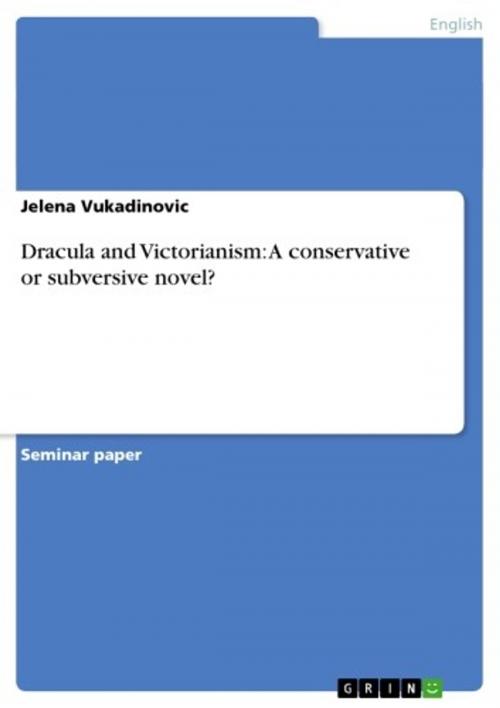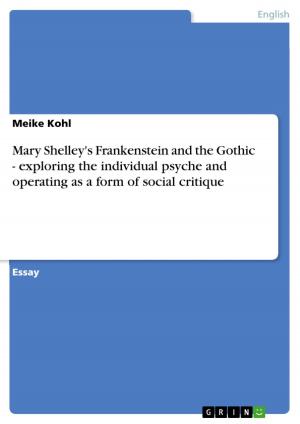Dracula and Victorianism: A conservative or subversive novel?
Fiction & Literature, Literary Theory & Criticism, British| Author: | Jelena Vukadinovic | ISBN: | 9783640314935 |
| Publisher: | GRIN Publishing | Publication: | April 24, 2009 |
| Imprint: | GRIN Publishing | Language: | English |
| Author: | Jelena Vukadinovic |
| ISBN: | 9783640314935 |
| Publisher: | GRIN Publishing |
| Publication: | April 24, 2009 |
| Imprint: | GRIN Publishing |
| Language: | English |
Seminar paper from the year 2005 in the subject English Language and Literature Studies - Literature, grade: 2,0, RWTH Aachen University (Institut für Anglistik), course: Gothic Novel, language: English, abstract: [...] What is even more interesting is that vampirism is present even in the every day life of some communities. The Gothic Rock movement for example seems to insist on the so-called vampire fashion in clothing, as well as on white painted faces and blood-red rouged lips. In some internet book and film forums one even comes across people who claim to belong to the growing community of the so called 'human living vampires'. Despite all these fictional and non-fictional modern vampires, the cliché of a dark gentleman in evening attire, preferably chasing young ladies in negligees, is still the first association in people's mind when it comes to mentioning vampires. This cliché apparently originated from the numberless films about the most famous of vampires - Count Dracula. Most of these film versions have kept only some superficial characteristics of Stoker's novel, as in today's popular culture Dracula has become something of a simple horror story. The novel is yet certainly more than an entertaining read. It offers, among other things, an interesting study of the late Victorian society. As it is the aim of this paper to analyse Dracula as a product of its time, it focuses on some of the issues through which societies are generally defined. The topics chosen for the analysis of the novel in the context of late Victorianism are first of all sexuality and gender roles. The choice of searching for potential signs of sexuality in a Victorian novel is quite obvious, since Victorianism is generally identified with extreme prudishness and double standards. The issue of gender roles will concentrate mainly on women roles, since the second half of the 19th century is one of the most important periods in history of female emancipation. Furthermore, religion in Dracula certainly deserves closer attention, especially in the context of Victorian crisis of faith. The role of Catholicism in the book should also be analysed in context of its rising influence in Victorian England. Science will be first treated in its traditional role as the antipode to religion, and subsequently its application and role in the novel will be analysed, especially in the context of Darwin's theory of evolution.
Seminar paper from the year 2005 in the subject English Language and Literature Studies - Literature, grade: 2,0, RWTH Aachen University (Institut für Anglistik), course: Gothic Novel, language: English, abstract: [...] What is even more interesting is that vampirism is present even in the every day life of some communities. The Gothic Rock movement for example seems to insist on the so-called vampire fashion in clothing, as well as on white painted faces and blood-red rouged lips. In some internet book and film forums one even comes across people who claim to belong to the growing community of the so called 'human living vampires'. Despite all these fictional and non-fictional modern vampires, the cliché of a dark gentleman in evening attire, preferably chasing young ladies in negligees, is still the first association in people's mind when it comes to mentioning vampires. This cliché apparently originated from the numberless films about the most famous of vampires - Count Dracula. Most of these film versions have kept only some superficial characteristics of Stoker's novel, as in today's popular culture Dracula has become something of a simple horror story. The novel is yet certainly more than an entertaining read. It offers, among other things, an interesting study of the late Victorian society. As it is the aim of this paper to analyse Dracula as a product of its time, it focuses on some of the issues through which societies are generally defined. The topics chosen for the analysis of the novel in the context of late Victorianism are first of all sexuality and gender roles. The choice of searching for potential signs of sexuality in a Victorian novel is quite obvious, since Victorianism is generally identified with extreme prudishness and double standards. The issue of gender roles will concentrate mainly on women roles, since the second half of the 19th century is one of the most important periods in history of female emancipation. Furthermore, religion in Dracula certainly deserves closer attention, especially in the context of Victorian crisis of faith. The role of Catholicism in the book should also be analysed in context of its rising influence in Victorian England. Science will be first treated in its traditional role as the antipode to religion, and subsequently its application and role in the novel will be analysed, especially in the context of Darwin's theory of evolution.















